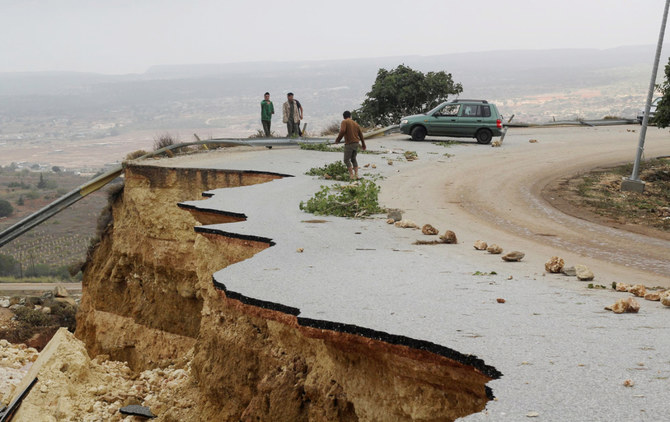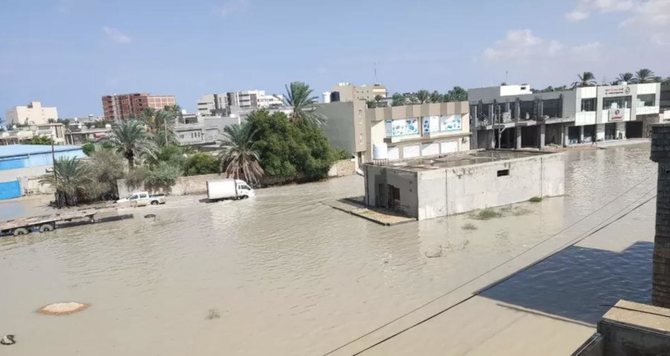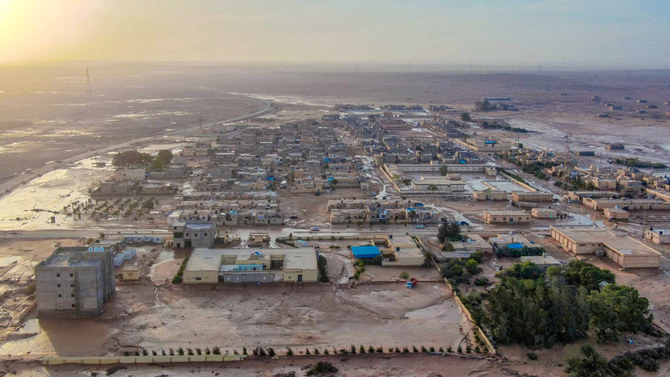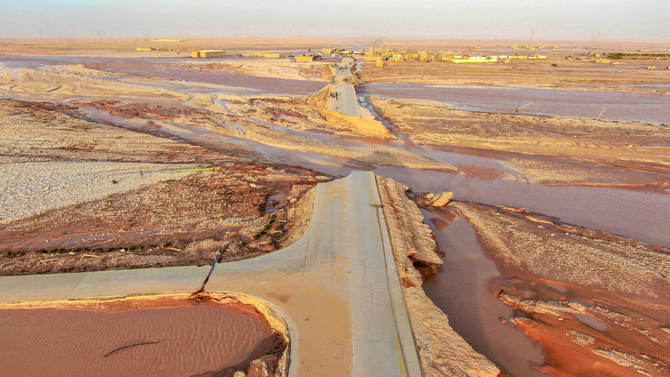BENGHAZI: Authorities in eastern Libya said at least 2,000 people were killed and thousands more were missing after a massive flood ripped through the city of Derna following a heavy storm and rain.
Ahmed Mismari, the spokesperson for the Libyan National Army (LNA) that controls eastern Libya, said in a televised news conference that the disaster came after dams above Derna had collapsed, “sweeping whole neighborhoods with their residents into the sea.”
Mismari put the number of missing at 5,000-6,000.
Earlier on Monday, the head of the Red Crescent aid group in the region had said Derna’s death toll was at 150 and expected to hit 250. Reuters could not immediately verify either figure.
Libya is politically divided between east and west and public services have crumbled since a 2011 NATO-backed uprising that prompted years of conflict. The internationally recognized government in Tripoli does not control eastern areas.
In Tripoli, the three-person Presidential Council which functions as head of state in the divided country asked the international community to help. “We call on brotherly and friendly countries and international organizations to provide assistance,” it said.
Osama Hamad, the head of a parallel eastern-based administration, told local television that more than 2,000 were dead and thousands more missing.
After pummelling Greece last week, Storm Daniel swept in over the Mediterranean on Sunday, swamping roads and destroying buildings in Derna, and hitting other settlements along the coast, including Libya’s second biggest city of Benghazi.
Videos of Derna showed a wide torrent running through the city center where a far narrower waterway had previously flowed. Ruined buildings stood on either side.
Eastern Libya’s Almostkbal TV broadcast footage that showed people stranded on the roofs of their vehicles calling for help and waters washing away cars.
“The missing are in the thousands, and the dead exceed 2,000,” Osama Hamad told Al-Masar TV. “Entire neighborhoods in Derna have disappeared, along with their residents ... swept away by water.”
Mismari said seven members of the LNA had died in the flood.
SURROUNDED BY WATER
Derna resident Saleh Al-Obaidi said he had managed to flee with his family, though houses in a valley near the city had collapsed.
“People were asleep and woke up and found their homes surrounded by water,” he told Reuters.
Ahmed Mohamed, another resident, said: “We were asleep, and when we woke up, we found water besieging the house. We are inside and trying to get out.”
Witnesses said the water level had reached three meters (10 feet).
West of Derna, visuals showed a collapsed road between the port town of Sousse and Shahat, home to the Greek-founded and UNESCO-listed archaeological site Cyrene.
Libya’s eastern-based parliament declared three days of mourning. Abdulhamid Al-Dbeibah, prime minister of the interim government in Tripoli, also declared three days of mourning in all the affected cities, calling them “disaster areas.”
Four major oil ports in Libya — Ras Lanuf, Zueitina, Brega and Es Sidra — were closed from Saturday evening for three days, two oil engineers told Reuters.
Search-and-rescue operations were ongoing, witnesses said. Authorities declared a state of extreme emergency, closing schools and stores and imposing a curfew.
In Tripoli, the interim government directed all state agencies to “immediately deal” with the damage and floods in eastern cities, but the administration has no sway in the east.
However, Dbeibah’s government works closely with the Central Bank of Libya, which disburses funds to government departments across the country.
The United Nations in Libya said it was following the storm closely and would “provide urgent relief assistance in support of response efforts at local and national levels.”
Qatar’s Emir Sheikh Tamim bin Hamad Al-Thani instructed the government to send aid to the affected area in eastern Libya, Qatar’s state news agency reported.

















